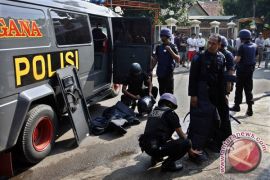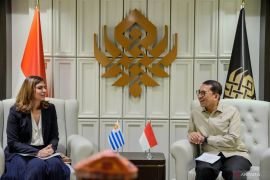The Canadian teenager presented his big hits including "Baby," on Saturday evening, April 24 at the Sentul International Convention Center, Bogor, with great success in front of at least 12,000 fans.
Less than a week later, on Wednesday evening (27/4), the American rock band from Los Angeles, also performed in Jakarta when the media was still busy reporting stories on terrorism and discoveries of planted bombs in several places in town.
Why those world-class artists seemed to be undeterred by the bomb scares and anyway decided to remain on their show schedules here?
Bomb scares have been foiled just within the weeks those artists had been scheduled to perform here. After a lone suicide-bomber who detonated himself at Cirebon Police`s mosque on April 11, police found another bomb hidden under a gas pipeline in Serpong, Banten province.
The big buck from the shows alone would not be the sole reason for them to perform when bomb scares had been around in Indonesia, a country with a thick record of being made terrorism target since terrorist bomb attacks in Bali in October 2002.
Indonesia which is among the world`s top countries in tackling terrorism may also be the reason. Police have anyway succeeded in hunting down and capturing the perpetrators just within days.
Praises for Indonesia`s success in fighting terrorism have been flowing in from around the world, from Washington, D.C. to Australian capital of Canberra and neighboring countries.
Josh Kurlantzick, Carnegie Endowment visiting scholar, in his article in Time Magazine, has noted that Indonesia has transformed itself from a country riddled with radical Islamist movements and terror threats to one of the world`s few triumphs in fighting terrorism.
Kurlantzik adds that Indonesia can be a fine model for many countries around the world for tackling terrorism. In its anti-terrorism effort, Indonesia has resorted to ways shunning draconian measures practiced by many countries.
"Rather than tossing terrorism suspects in jail indefinitely or torturing them, as is the case with suspects in Iraq or Russia`s Chechen Republic, the Indonesian government successfully prosecutes cases against these militants in court," he says, adding that the approach has been keeping public opinion on Jakarta`s side.
"We appreciate Indonesia`s success in tackling terrorism," said President Benigno Simeon Aquino III of the Philippines when he visited Indonesia last March during which the two governments had signed a cooperation agreement for fighting terrorism.
Chloe Choquier, research intern at IPCS (Institute for Peace and Conflict Studies) in New Delhi, India, who has conducted independent research on security issues in the region, said Indonesia has greatly improved its capacities and efforts over the last few years, with a wake-up call provoked by the July 2009 Jakarta bombing.
This archipelagic state officially adopts a "soft approach" based on the prosecution of most of the 450 extremists arrested since 2002, Choquier said
By not declaring a War on Terror and by treating terrorists as criminals rather than enemies, Indonesia managed to gain public support from moderate Muslims. The de-radicalization programs established from 2004 in Indonesian prisons succeeded to persuade dozens of jihadists to renounce violence and cooperate with the police.
Sydney Jones, senior adviser to the Asia program of the Brussels-based International Crisis Group, one of Indonesia`s great achievements has been to ensure that terrorism remains a law enforcement issue to be handled by the police, not the military.
The government decided early on that it would not engage in widespread preventive detention or closed trials; the media coverage of more than 250 trials to date has been a major factor in convincing the Indonesian public its terrorists are homegrown, she said in a recent review of Indonesia`s effort on eradicating radicalism.
Despite the chains of successes in revealing or cracking down terrorist network, the Indonesian security authorities have never been less vigilant as the fight remains sometimes far from media spotlights, she adds.
Ansyaad Mbai, head of the National Agency for Tackling Terrorism (BNPT), said efforts to stop bomb attacks were being intensified after authorities found evidence that the terrorists who had sent package bombs were also planning more attacks, including on religious buildings.
"Those already arrested were the suspected perpetrators of the recent parcel bombing and who are also planning attacks on churches," said Mbai after a security meeting at Presidential office in Jakarta.
Security personnel, he said, keep on investigating the previous attacks and other cases relating to the bomb attack.
Education Minister Muhammad Nuh has said this week that his ministry would review several lessons taught in schools. This plan must have been designed following recent disclosures on radicalism where students in schools and universities have been made targets of recruits.
"We will put an emphasis on nationalism in lessons, such as on citizenship and the Indonesian language," Minister Nuh said, adding that religion lessons would be `revitalized` in coordination with the Religious Affairs Ministry.
"Lessons should not only be interpreted as ideas but must also impact on attitudes," he said. (*)
Reporter: By Vicki Febrianto
Editor: Kunto Wibisono
Copyright © ANTARA 2011










